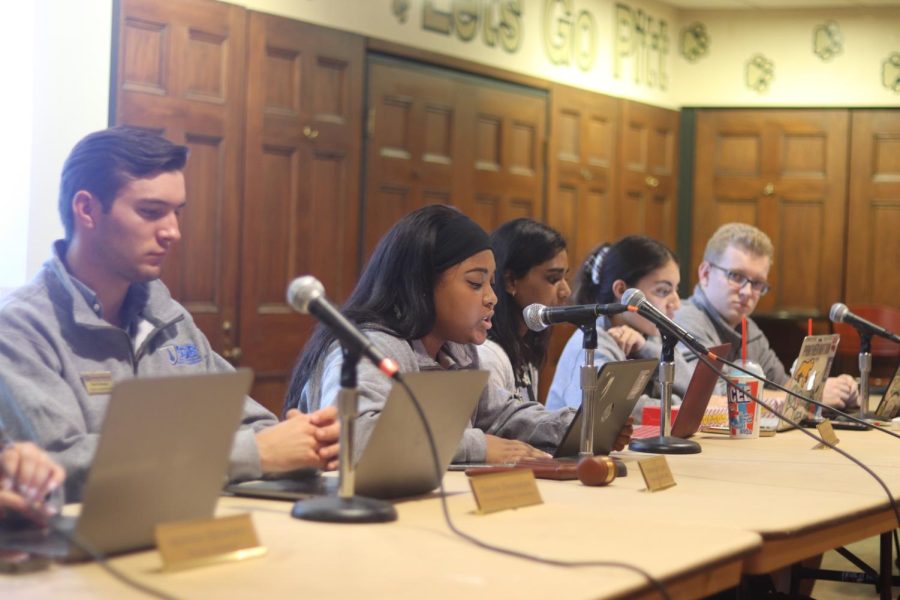SGB allocated $511K during fall semester to clubs, organizations
Patrick Cavanagh | Senior Staff Photographer
Student Government Board at its first meeting of the semester at Nordy’s Place on Sept. 6.
January 24, 2023
Student Government Board allocated about $511,000 during the fall semester, according to their newly released report.
Carson Hawk, the chair of the allocations committee, said in the report that the group spent about $259,000 on supplemental requests. Supplemental requests can include five categories — competitions, conferences, general expenses, off-campus programs and on-campus programs.
The approval rate for these types of requests, according to the report, sits at 82.5%, a 10% increase over the average rates of the last three years. They approved about $259,000 and denied about $55,000 out of 125 requests. They spent the most on competition requests at $85,000, followed by on-campus programs and then general expenses.
Competitive club sports received the most money at about $57,000. The max amount each club sport can request in a year is $12,500 or $15,000 depending on their roster size. Ethnic/cultural organizations received about $50,000, special interest groups received $45,000 and academic groups got $34,000.
“We fund based on the quality of the request, not the specific organization requesting, and we are always open to new types of events and new ways to spend the student activities fee so long as they align with our manual,” Hawk said in the allocations report.
The allocations committee also spent about $252,000 in budget spending. Budget submissions are when certain organizations seek to have all their supplemental expenses for the semester reviewed at once. The report said they typically receive more money this way than they would through strictly supplemental requests.
Panther Racing Club, which submitted 12 requests in a budget submission, recieved about $64,900. SGB also approved about $59,200 for Pitt Ski and Snowboard Club, $40,400 for Greek Week, $33,500 for Black Action Society, $25,500 for Chabad, $13,500 for Asian Student Alliance, $12,000 for Habitat for Humanity and $3,000 for the Interfraternity Council.
In the report, Hawk said SGB has $900,000 to spend throughout the year, and they “aim to spend all of it.” For the spring semester, the group has about $389,000 left to allocate. The report said SGB hopes to spend $300,000 to $400,000 on budget spending for the year.
SGB allocates money to University-affiliated student organizations from the student activities fund, which is financed through a $100 fee per semester in every student’s tuition.
SGB President Danielle Floyd said the allocations committee’s dedication to communication is helping get money to students via clubs and organizations.
“The communications that we are doing about the Student Government Board and what we can do is paying off,” Floyd said. “It is the culmination of all the efforts towards communication between students and us.”
To submit an allocations request, Hawk said clubs must follow these steps in order.
- Go to the SGB website at sgb.pitt.edu
- In the drop down menu at the top right, select “Allocations”
- Select “Click Here to Submit a Supplemental Request”
- Fill out the form in its entirety
- Make sure the request is in line with all policies outlined in the allocations manual
He said the process from submission to review takes approximately a week to complete, and the allocations committee meets on Thursday nights and reviews each submission. According to Hawk, the main priority of the allocations committee is to make sure all requests fall in line with the Allocations Manual and its policies.
“Each submission is reviewed to make sure it falls in line with the Allocations Manual, which keeps us honest to the student body,” Hawk said. “We pride ourselves on our quick turnaround and our ability to get student money back into student’s hands.”
The best piece of advice Hawk offered to clubs and organizations in order to guarantee their access to money is to clearly communicate their needs. Hawk said allocations liaisons are the organization’s best connection to make in order to certify their proposal is in the best possible shape to get approved.
“You can find all the liaisons office hours and emails on the allocations webpage and they are always going to try to get your request approved in whatever way possible,” Hawk said. “We are used to people in charge of funds being removed or bureaucratic, but we are all students who like doing this and helping other students.”








